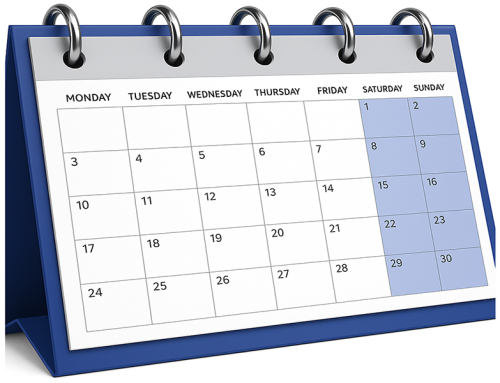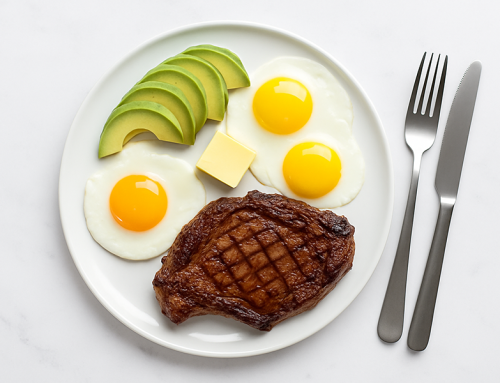You’re losing fat too slow. You want to burn fat faster. However, you’ve heard that cutting calories too much will kill your metabolism, tank your hormones and wreak all kinds of havoc in your body, not to mention you’re so hungry on low calories, you’re miserable. But still, you see people doing it all the time – they cut calories lower than they’re supposed to, they get ripped abs, and they don’t seem any worse off for it. That begs an important question…
Is it ever safe to cut calories aggressively to try to burn fat faster?

It turns out, the answer isn’t as cut and dried as some people think. In today’s post I answer a reader question about aggressive calorie deficits. In the process, I’ve created a new set of guidelines. Below, you’ll see my 10 calorie cutting rules to safely burn fat faster.
Q: Tom, I decided to drop my calories to 35% below maintenance to see if I can lose fat faster, but part of me feels like I’m going against the advice in Burn the Fat, Feed the Muscle. I only have 8 pounds I want to drop, but I’m going on vacation in 5 weeks and would love to achieve my goal in that time and look ripped enough to see my abs. I’m currently 151 pounds and 21% body fat. I’m moderately active, including lifting weights. I calculated my maintenance at 2280 calories per day, so 35% deficit would be 1480 calories per day.
I know about the negative effects of cutting calories too much and I read in your book that 30% is considered an aggressive deficit and that’s usually the most you would cut, but 1480 calories doesn’t seem too low. Am I doing something terribly wrong to use a 35% deficit for only 5 weeks? Do you have any other advice on the calorie deficit or cutting fat faster, but without harming your metabolism or your health?
A: You’re not necessarily doing anything wrong by using a very aggressive deficit, especially only 35%, as long as you understand the potential risks that come along with the benefit of burning fat faster. If you weigh the pros and cons and you take all precautions to limit the risk, it makes sense in some circumstances to reduce calories a little more than 30% below maintenance.
I know there has been a lot written about the risks of cutting calories too much, including on this site and in my book, Burn the Fat, Feed the Muscle. But dropping calories more than 30% below maintenance is not something you should never do, it’s simply a judgement call you need to make, based on your situation.
Here is a quick recap on calorie deficit levels:
15-20% = conservative deficit (slow fat loss, no risk)
20-25% = moderate deficit (moderate fat loss, very low to no risk)
25-30% = aggressive deficit (moderately fast weight loss, low to moderate risk)
31-40% = very aggressive deficit (fast weight loss, risky)
50%+ = semi starvation/starvation (very fast weight loss, high risk; potentially unhealthy)
It’s worth highlighting two points about these numbers: The first is that most people don’t go over a 30% deficit when doing Burn the Fat, Feed the Muscle because that keeps risks low. The second is that obesity scientists consider a 50% deficit to be “semi-starvation,” and recommend not attempting this much (prolonged) calorie restriction without medical supervision. I think “semi-starvation” is best avoided completely. This however, leaves some gray area around 35%, give or take a little, for discussion.
If you’re considering larger calorie cuts, keep in mind that the “risks” of low calories include:
- Hunger
- Cravings
- Feeling deprived
- Low energy
- Weakness (strength loss)
- Loss of endurance
- Muscle loss
- Nutrient deficiencies (essential vitamins, minerals, fats and amino acids)
- Metabolic adaptation
- Bingeing
- Rebound weight gain
Sounds bad, but there are circumstances where it might make sense to cut calories more aggressively.
10 Calorie Cutting Conditions For Safely Burning Fat Faster
Run down my list of aggressive calorie cutting conditions below and see how many fit your situation. If most or all of these 10 conditions apply to you, then going with a more aggressive deficit can be done with minimal risk and you’ll gain the benefit of more rapid fat loss.
1. When you are under deadline pressure.
When you don’t have much time to reach your goal and a deadline is impending, which you can’t change or you don’t want to change even if you could, and if you think you are behind schedule, then this is one case where it makes sense to increase your calorie deficit. If you don’t have a competition, vacation, photo shoot or some other time-bound event you are training for and the date is closing in rapidly, then what’s the hurry? Why not lose the fat a little bit more slowly, with less risk and less suffering?
2. When you are only cutting calories aggressively for a short period of time.
When you have a fast-approaching deadline, then by definition, you will only be cutting calories aggressively for a short amount of time. Aside from the fact that you might be hungry and there’s risk of rebound when a strict diet is over, there aren’t many serious side effects to cutting calories low for a short time.
If you’re only doing this for a month, give or take a week or two, it should’t be a problem. Most of the really negative effects of very low calorie diets come from trying to follow very low calorie or starvation diets for month after month, or getting trapped in the vicious cycle of chronic low calorie dieting. This can be unhealthy for your metabolism and increase risk of muscle loss.
3. When you can tolerate a little hunger and you don’t have to endure severe hunger or cravings during the diet.
Before you embark on a very low calorie diet, you should consider how your body, mind and personality can handle larger calorie deficits (and or reduced carbs) in terms of the hunger or cravings it might produce.
Cravings can be difficult to resist, but anyone can do it with the right environment, support, and mental toughness because cravings are usually psychological. You may miss specific foods or larger portions of food, and it’s easy to give in when you have those thoughts. However, if you know you’re susceptible to cravings and bingeing, then tread lightly with both calorie restriction and complete restriction of specific foods or food groups.
Hunger, on the other hand is physical. It can be triggered not only from an empty stomach, but also by hormones. Hunger can get the best of anyone with aggressive calorie deficits, so if you cut calories too much and end up bingeing because you can’t stand the hunger, any benefits you would have gained from a bigger deficit get wiped out.
If you’re one of the lucky ones where hunger doesn’t bother you that much, then you should be okay with a more aggressive deficit.
4. When you are confident you won’t binge when the diet is over.
You might successfully strip off the body fat at a rate faster than average. You might reach your goal of getting ripped by using an aggressive calorie deficit. But you have to ask yourself, what happens after that? the statistics for weight re-gain are almost depressing: Between 80% and 95% of of all dieters gain back the weight they lose.
There is some evidence that extremely restrictive diets increase the risk of weight regain, but contrary to popular belief, there is no definite proof that doing a short-term very low calorie diet will always increase the risk of relapse. What then, is the “secret” to being among that small percentage of lifetime maintainers? That’s a complex question, but it seems to depend at least partly on each person’s mindset, and their personal tolerance for hunger and food restriction.
It also depends on how well they prepare for what comes after the diet (many people don’t give a single thought to maintenance until after they’re staring in the mirror at the aftermath of a post-diet binge). It’s a human tendency to hold out with sheer willpower until a deadline date has passed. Then when the goal is achieved, they completely let loose, undoing in days much of the work that was done in the many weeks preceding the event.
This is why people who are highly susceptible to hunger or have a history of binge eating are not good candidates for any type of aggressive dieting including large calorie deficits. If you can handle the pressure of a larger deficit for weeks (or months) without exploding in a binge at the end, that’s one more indication that it’s probably okay to go ahead with an aggressive calorie deficit.
5. When your body fat level is not already low.
The lower your body fat level, the higher your risk of muscle loss and metabolic adaptation when you restrict calories. The higher your body fat level, the lower the risk. (Overweight men and women can use a larger calorie deficit and lose weight faster without negative effects).
If you’re already lean and trying to get super lean (ripped, six pack abs, photo shoot ready, etc.), your body’s instinct is to protect the remaining fat reserves, even to the point of giving up muscle for energy first. It’s a starvation protection and survival mechanism. If a person is overweight or obese, there are large reserves of fat on the body, so there’s really no danger of impending starvation. If calories are cut aggressively, there’s a much lower risk of muscle loss, extreme hunger or metabolic slowdown.
Therefore, if you’re lean, like a bodybuilder or figure athlete starting to get ready for competition, you should be cautious about using aggressive calorie deficits. You’d be better off keeping the deficit conservative and starting your diet earlier to allow for a slower and safer rate of fat loss, with maximum retention of muscle tissue. Ideally, you’d simply stay leaner in the off season so you don’t have much to diet off to begin with.
6. When you’re training consistently, with the primary focus on moderate to heavy weight training
Weight training is the number one key to maintaining your lean body mass when you’re in a calorie deficit. If you’re training consistently and progressively, continuing to increase weight or at least the number of reps you do with the same weight, your risk of losing muscle is low.
One of the biggest mistakes dieters make is thinking that light weights and high reps will improve fat loss. The truth is, fat loss is a function of calorie deficit, so unless your weight training increases your calorie deficit, reducing the pounds lifted will only make your lifting program less effective at maintaining muscle and strength while dieting.
Heavy training is usually considered the 4 to 6 rep range (the strength zone), and moderately heavy training is considered the 8 to 12 rep range (the hypertrophy zone). Occasionally it’s beneficial to use higher reps in the 13 to 20 range, but for maintaining muscle and strength, the best optimal approach is doing the majority of your training in the 6 to 12 rep range.
An even bigger mistake when dieting in a large calorie deficit is to focus only on cardio. Unfortunately, many people think dichotomously about training; they believe that cardio training is for burning fat and weight training is only for building muscle. Actually, both types of training burn calories, yet only weight training will build muscle and strength and prevent you from losing lean mass when dieting. When you’re in an aggressive calorie deficit, doing too much cardio, without weight training, can increase the risk of muscle loss.
7. When you’re eating enough protein.
The second most important key to maintaining your lean body mass while dieting is being sure your protein intake is sufficient. Most people know that when you’re weight training, your protein needs go up above what a sedentary person would require. What most people don’t know is that when your calories go down, your protein needs don’t go down. If anything, your protein needs go up when you’re in a calorie deficit.
There is a fairly wide range of acceptable protein intakes for resistance-trained people, from 0.8 grams of protein per pound of body weight per day to about 1.0 grams per pound of lean body weight. The bigger your calorie deficit is, the more you benefit from leaning toward the higher end of the protein range. Some bodybuilders are known to consume up to 1.2g/lb or even more during pre-contest prep when calories are very low.
8. When you’re certain that you’re getting all the essential nutrients you need.
The lower your calories go and the less food you eat, the higher your risk of falling short on a variety of nutrients. Of first concern is protein. At the very least, enough calories have to be consumed to meet your protein needs, which provide you with essential amino acids. On top of protein, some fatty acids are also essential, so you have to eat enough calories to obtain those as well.
The more restrictive your diet is, and that includes the restriction of specific food groups as well as total calorie intake, the higher your chance of vitamin, mineral, phytonutrient and fiber deficiencies. Calories from starchy carbs and grains can be reduced substantially, but eating plenty of vegetables and fruits on top of the protein and healthy fats is necessary to cover your bases for micronutrients.
9. When you’re losing fat and not losing lean muscle.
If you’re already dieting with a very aggressive calorie deficit, and things are going well, then don’t worry or over-think too much, just pay attention to how you feel (strength, energy, hunger, etc.). Keep measuring your results every week to make sure you stay on track.
If you’re losing fat and maintaining all your lean body mass on a very aggressive calorie deficit then why not stay with it? (You’ll get maximum fat loss that way). On top of getting good body composition results, if you’re not suffering from extreme hunger or cravings, and you’re diligently meeting all your nutritional needs, then there’s not much to worry about.
In fact, if you’re on a very conservative calorie deficit of only 15% -20% and the fat loss is painfully slow, it makes sense to try increasing the deficit a bit (you’ll speed up fat loss that way). Just monitor your results and keep doing more of what’s working.
10. When you’ve planned ahead for maintenance for the next goal.
It’s possible you may reach a short term fat loss goal using an aggressive diet and losing fat faster than average. But what then? Most people haven’t planned ahead, so they abruptly stop the diet and go back to how they were eating before, or worse, they end it with a huge binge and immediately begin gaining back the fat they lost.
Most dieters are very short-sighted. The most successful people have long-term time perspective, and they are perpetual goal setters. They think about fitness, health and self-improvement as a lifelong journey, and the goals are simply stepping stones along the journey.
If you’re always thinking one goal in advance and you have a plan for long term maintenance for when your current fat loss goal is achieved, you’re much less likely to be one of the weight loss relapse statistics.
– Tom Venuto,
Author of Burn The Fat, Feed the Muscle.
Founder & CEO, Burn The Fat Inner Circle
PS. Want to burn fat faster, or even see your abs? The number one priority is proper fat burning nutrition. To learn more, be sure to read the best-selling bible of fat loss, Burn the Fat Feed the Muscle. You can get personal support and guidance through the “ab-shredding” process at our Burn The Fat Inner Circle fitness community. Visit: www.BurnTheFatInnerCircle.com

Tom Venuto is a natural bodybuilding and fat loss coach. He is also a recipe creator specializing in fat-burning, muscle-building cooking. Tom is a former competitive bodybuilder and is today a full-time fitness writer, blogger, and author. His book, Burn The Fat, Feed The Muscle is an international bestseller, first as an ebook and now as a hardcover and audiobook. Tom’s book about emotional eating and long-term weight maintenance, The Body Fat Solution, was an Oprah Magazine and Men’s Fitness Magazine pick. Tom is also the founder and CEO of Burn The Fat Inner Circle – a fitness support community with over 51,000 members worldwide since 2006. Click here for membership details
Related Posts You May Also Be Interested In:
3500 calories to burn a pound of fat? Is this calorie deficit formula all wrong?






What do you recommend when a deficit of about 25% to 35% brings you close or under your BMR?
I typically recommend 20 to 30% below maintenance because it’s sensible and supported by the research as such. this post is about the conditions where it may be acceptable to drop a little more than 30% under maintenance. You can opt for smaller deficits, but results will be slower. Typically calories don’t fall below BMR when selecting a deficit conservatively, but there is no rule or evidence that you can’t set calories lower if risks are managed (deficits usually aren’t set based on BMR as an absolute bottom – thats a common misconception). If you go more than 30%, then that’s what this post is all about – i recommend following the advice in the post.
Would cheat meals/days once a week prevent a lot of the risks?
Once or twice a week up to maintenance calories (or a tiny bit above), absolutely, BUT better to call them refeeds not cheats, because there is a difference that’s more than semantics.
Nice and informative blog regarding the calories. Thanks for sharing this.
Verry interesting article
[…] Reading 1. Is It Ever Safe To Cut Calories More Aggressively To Burn Fat Faster? 2. Foods High in Water 3. The Bigger Benefit Of Supplements That No One Talks About 4. Rowing […]
Thanks you for sharing this useful information!
Hello. This is very helpful. Would the guidance regarding an 30% deficit stay the same if one is starting with a TDEE at about 1300 (oldish, sedentary, short). It’s the below 1200 calories that is the issue. Thank you.
hi Cee. Everything is relative when you’re using percentages, so it’s still an accurate way to set a calorie deficit- if you want a fairly aggressive deficit – regardless of your age, activity or height. But, if you prefer, you can also set your deficit more conservatively, like say 20% – it simply means you’ll drop fat a little slower. But… you’ll still get there! Tom V